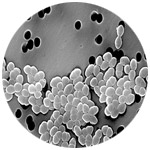j. Vancomycin-Resistant Enterococcus
|

|
Enterococci have been identified as the third most frequent cause of nosocomial bacteremia (Boucher et al. 2009). E faecium is now the major contributor to AMDR in surgical wounds and urinary tract infections. Penicillin, ampicillin, piperacillin, imipenem, and vancomycin are among the few antibiotics that show consistent inhibitory, but not bactericidal, activity against Enterococcus faecalis (Huycke et al. 1998). The spread of antibiotic resistance among enterococci, with some microorganisms becoming resistant to all standard therapies, highlights both the vulnerability of available antibiotics as well as the looming prospect of a "postantibiotic era" with no effective drugs to fight the infections (Huycke et al. 1998). Vancomycin resistance is independently associated with increased mortality among patients with enterococcal bloodstream infection (Diaz-Granados et al. 2005).
|